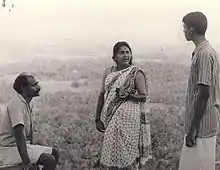Peruvazhiyambalam
Peruvazhiyambalam (transl. High Road Temple) is a 1979 Indian Malayalam-language crime drama film written and directed by P. Padmarajan, based on his novel of the same name. The film was Padmarajan's directorial debut and the acting debut of Ashokan, who played the central character, Raman. The film is an incisive examination of how violence or totalitarianism works in our society; it dealt with disturbing questions relating to masculinity and how people adore and dread it at the same time. It was one of the last black-and-white Malayalam films.[1][2]
| Peruvazhiyambalam | |
|---|---|
 | |
| Directed by | Padmarajan |
| Written by | Padmarajan |
| Based on | Peruvazhiyambalam by Padmarajan |
| Starring | Ashokan Bharat Gopy Jose Prakash K. P. A. C. Azeez K. P. A. C. Lalitha Ramesh Geetha |
| Cinematography | Kannan Narayanan |
| Edited by | Ravi |
| Music by | M. G. Radhakrishnan |
Production company | Prakash MovieTone |
Release date |
|
| Country | India |
| Language | Malayalam |
The Hindu described this film as one of the finest films in Malayalam.[3] It won the National Film Award for Best Feature Film in Malayalam. The film was included in IBN Live's list of 100 greatest Indian films of all time.[4]
Plot
Fifteen-year-old Raman lives alone with his older sister Bhagyam, their parents having died several years prior. The town bully Prabhakaran Pillai is killed by Raman. He escapes from murder charges by hiding from the police with the help of a teashop owner Viswambharan and a prostitute.
Cast
- Ashokan as Raman/Mani
- Bharat Gopy as Viswambharan
- Jose Prakash as Paramu Nair
- Sukumari as Paramu Nair's wife
- K. P. A. C. Azeez as Prabhakaran Pillai
- Santhakumari as Prabhakaran Pillai's wife
- K P A C Lalitha as Kunnumpurath Devayani, the prostitute
- Krishnan Kutty Nair as Vaidhyan
- Valsala Premdevdas
- Chandrika
- Santhosh Kumar
- Muthukulam K.G.
- Giri
- George Joseph
- A.N. Nair
- V.T. Thomas
- Rathi
- Bobby
- Madhavikutty
Accolades
References
- "How Padmarajan's 'Peruvazhiyambalam' is forerunner to Malayalam's angry-young-men films". The News Minute. 5 January 2020. Archived from the original on 9 July 2021. Retrieved 6 July 2021.
- Vijayakumar, B. (28 January 2018). "Peruvazhiyambalam: 1979". The Hindu. Archived from the original on 30 August 2022. Retrieved 30 August 2022.
- Venkiteswaran, C. S. (21 January 2010). "Storyteller beyond compare". The Hindu. Archived from the original on 31 March 2022. Retrieved 30 August 2022.
- "100 Years of Indian Cinema: The 100 greatest Indian films of all time". IBN Live. 26 April 2013. Archived from the original on 25 April 2013. Retrieved 24 May 2013.
- "State Film Awards". Kerala Government. Archived from the original on 3 March 2016. Retrieved 26 September 2015.